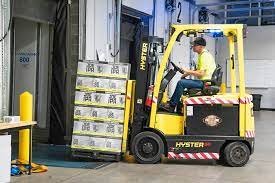Before a consumer gets their hands on a product, it travels through a dizzying distribution channel. This journey involves many stops, each bustling with forklifts hoisting and hauling loads.
Behind the scenes, forklift technicians perform crucial service work to keep this vital equipment running smoothly. These heavy equipment mechanics are real-life heroes, from rewiring electric forklifts to working with lithium batteries.
Maintenance
Many facilities include forklift uptime in their overall performance measures, and low uptime reflects poorly on maintenance departments. Preventative forklift maintenance can ensure that equipment is available when needed and reduce the likelihood of costly repairs.
Welch Careers technicians must have strong analytical skills to troubleshoot problems and determine the best action. They also must be comfortable reading work orders and preparing detailed repair procedures. They may also communicate with service advisors or customers; practical communication skills are essential.
Mechanics may work in automotive dealerships, repair shops, dedicated forklift service centers, or other maintenance facilities. In these settings, they often work in a team, collaborating with other technicians or service advisors to ensure efficient operations. Often, they must make repairs outside in a wide range of weather conditions. They must be comfortable working with greasy tools, standing or lying in awkward positions, and navigating around large engine parts. They also may work evening and weekend call-in shifts.
Repair
A forklift with a broken engine or steering system can bring a busy warehouse to a standstill. In addition to preventing workplace accidents, repairs help ensure the safe, efficient movement of materials and goods throughout the facility.
Forklifts use mechanical components that get a lot of wear and tear from everyday use in harsh environments. These machines constantly move and lift heavy loads, so they need regular inspections to identify problems.
Some forklifts require more maintenance than others, depending on their operating conditions. For example, electric forklifts typically need less maintenance than diesel or gas-powered ones.
Forklifts need regular cleaning, lubrication, and adjustments to maintain optimal performance. Jobs for diesel mechanic licensed operators and technicians should conduct all maintenance checks and inspections. For example, employees should inspect the overall condition of a forklift and check that the air filter is clean, that the forks are in good working order, and that all safety features function properly.
Installation
Forklifts are motorized vehicles that lift, transport, and move loads. They have a cab for the operator, including a steering wheel, brake, and acceleration pedals. Some forklifts have seats, while others are designed for the driver to stand. The hydraulic system within a forklift uses a series of levers to control attachment functions, such as a tilt lever that changes the angle of the forks and a lift lever that controls the height of the forks. A side shift lever controls the horizontal movement of the carriage.
Often, a forklift’s hydraulic system requires oil to function correctly. If the forklift leaks oil, there’s not enough to lubricate different moving parts and prevent them from grinding together. Adding oil or wiping down the surface is not a practical solution to this problem, and the mechanic needs to repair the leak instead.
Diesel mechanics also inspect brake systems, engines, and steering mechanisms. They follow checklists to ensure they check all critical components and repair or replace them as needed. They may raise and lower trucks, buses, and heavy equipment using jacks or hoists.
Troubleshooting
Diagnosing and repairing complex forklift issues without the proper training or knowledge could cause further damage, ineffective repairs, or create safety hazards. Professional technicians are experienced in troubleshooting and can quickly pinpoint the source of a problem so they can fix it efficiently.
Mechanics are also trained to understand the differences between diesel engine systems and other vehicle components to identify the appropriate solutions. This ensures the best outcome for the customer and protects the company from liability.
Some diesel mechanics work as field service technicians and travel to customers’ locations, such as construction sites or agricultural facilities, to perform on-site repairs and maintenance. This requires them to have reliable transportation and the necessary tools and equipment for servicing diesel engines in the field. They also work with service advisors and parts personnel to plan maintenance procedures. They document their repairs and maintain accurate records of work performed and parts used.
